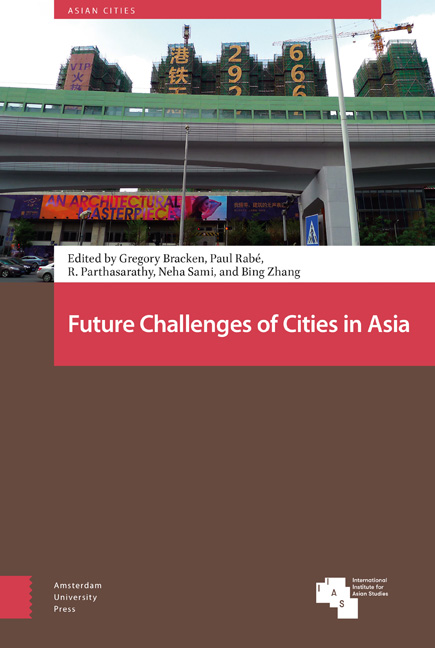Book contents
- Frontmatter
- About the Three UKNA Volumes
- Contents
- List of Figures and Tables
- 1 Future Challenges of Cities in Asia: An Introduction
- 2 Human Agency in the Asian City
- 3 Toward Inclusive, Vital and Livable City Scenarios: The Transformation of Urban Villages in Shenzhen
- 4 Cultural Dilemma in Beijing's Urban Regeneration: From Liulichang Cultural Street to Qianmen Street and Yangmeizhu Oblique Street
- 5 Housing as Heritage: The Great Urban Dilemma of the Global City of Shanghai
- 6 Not an Act of God: Lessons from a Disaster in the Settlements Planning of a River City
- 7 The Political Ecology of Climate Injustice in Bangkok
- 8 Assessing Flood-Related Vulnerability of the Urban Poor
- 9 The Ecological Future of Cities: Evaluating the Role of Green Infrastructure in Promoting Sustainability/Resilience in India
- 10 Hong Kong's “Rail-plus-Property” Development: A Model for Financing Public Transportation in Developing Cities in Southeast Asia?
- 11 Large Infrastructure Projects: The Emergence of Corridors in Asia
- Index
- Publications / Asian Cities
2 - Human Agency in the Asian City
Published online by Cambridge University Press: 21 November 2020
- Frontmatter
- About the Three UKNA Volumes
- Contents
- List of Figures and Tables
- 1 Future Challenges of Cities in Asia: An Introduction
- 2 Human Agency in the Asian City
- 3 Toward Inclusive, Vital and Livable City Scenarios: The Transformation of Urban Villages in Shenzhen
- 4 Cultural Dilemma in Beijing's Urban Regeneration: From Liulichang Cultural Street to Qianmen Street and Yangmeizhu Oblique Street
- 5 Housing as Heritage: The Great Urban Dilemma of the Global City of Shanghai
- 6 Not an Act of God: Lessons from a Disaster in the Settlements Planning of a River City
- 7 The Political Ecology of Climate Injustice in Bangkok
- 8 Assessing Flood-Related Vulnerability of the Urban Poor
- 9 The Ecological Future of Cities: Evaluating the Role of Green Infrastructure in Promoting Sustainability/Resilience in India
- 10 Hong Kong's “Rail-plus-Property” Development: A Model for Financing Public Transportation in Developing Cities in Southeast Asia?
- 11 Large Infrastructure Projects: The Emergence of Corridors in Asia
- Index
- Publications / Asian Cities
Summary
Abstract
Instead of yearning for absolute freedom as in the Western city, human agency as an idea seems to be generally understood as conditional in the Asian city. This chapter discusses the obscuring of indigenous urban traditions in Asia, the role of human agency in relation to the meanings of property ownership, conceptions of human labor, and the aesthetic experience of contingency, in an attempt to explore alternative ideas and practices of the place of human life in the environment. Human agency in Asian cities contains elements of intellectual and urban insights that have potential for future cities. However, these potentials and insights must be excavated and reformulated in order to gain theoretical and political efficacy in our fast-changing world today.
Keywords: human agency, land rights, labor, aesthetics of contingency
The assertion of Asia – and the Asian city – has largely been a social-political project: to build independence from its colonial dependence through the constructs of nation-states and national identities; it comes with all the intellectual anxieties and practical difficulties associated with this project. This chapter seeks a different kind of opportunity in the virtue of diversity of urban ideas and realities, which is crucially important, like in an ecosystem, to the long-term viability of city making. Have we been thrown off balance by the ever-increasing forces of monoculture today? Quite possibly; we pursue more or less similar goals worldwide with intense competition for the same finite resources. Crucially, we change our environment with cities, which, in the last instances, are imagined with intellectual conceptions, even though these conceptions are often obscured by the bustling appearances of commerce and entertainment, and by the immediate environmental and humanitarian crises taking place in them. What makes Hong Kong and Florence look and feel so different is not only the commodities or cultural performances that both cities house (today they have much in common), but also the real and material differences that result from intellectually formulated design and organizational decisions: Who has the final say in the use of land? Should we partition the city? How open or closed should a city be? What is a beautiful city? In each case, answers can be very different, leading to different physical outcomes. Articulating these differences would only make sense if they have potential to offer alternatives to our current intellectual predicament over the future of the environment.
- Type
- Chapter
- Information
- Future Challenges of Cities in Asia , pp. 23 - 38Publisher: Amsterdam University PressPrint publication year: 2019
- 1
- Cited by



